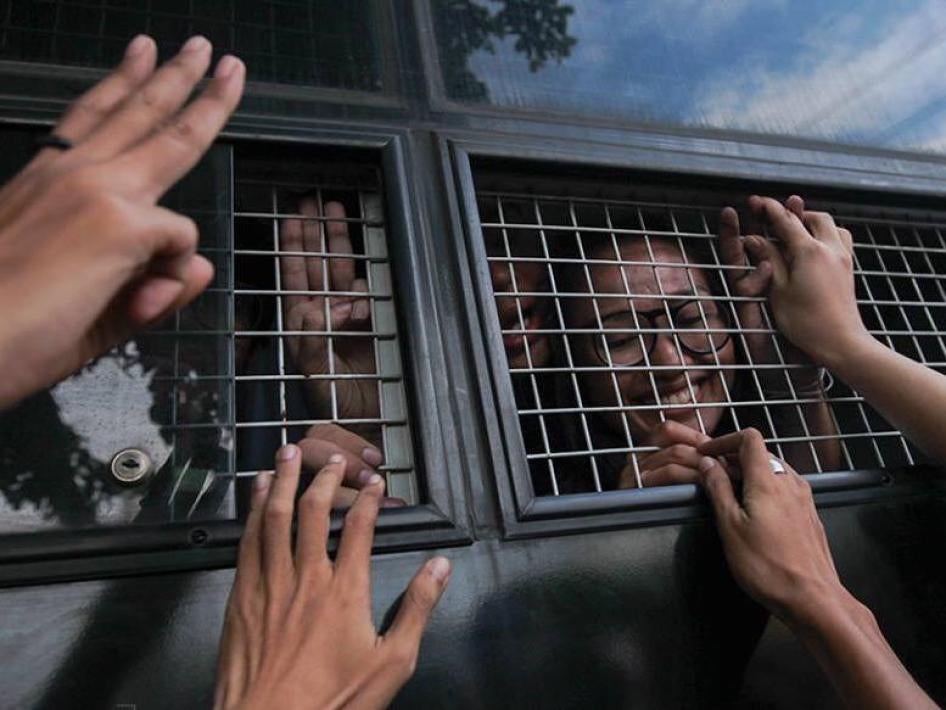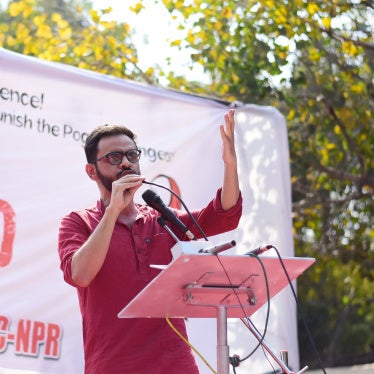(New York) – Thai authorities should immediately drop all charges and release unconditionally 14 student activists who peacefully expressed opposition to military rule.
On June 26, 2015 in Bangkok, police and soldiers enforced a military court warrant to arrest 14 students from the Neo-Democracy Movement for sedition and violating the military junta’s ban on public assembly. The students are now held in the Bangkok Remand Prison and the Central Women Correctional Institution for 12 days while awaiting trial in a military court.
“Thailand’s junta should immediately stop arresting and prosecuting student activists,” said Brad Adams, Asia director. “While insisting they aren’t dictators, the Thai generals have used the military courts as a central feature of their crackdown against peaceful criticism and political dissent.”
Authorities arrested Rangsiman Rome, Wasant Sadesit, Songtham Kaewpanphruek, Payu Boonsopon, Apiwat Suntararak, Rattapol Supasophon, Supachai Pookhlongploy, Apisit Sapnapapha, Panupong Sritananuwat, Suvicha Pitungkorn, Pakorn Areekul, Chatupat Boonyapatraksa, Pornchai Yuanyee and Chonticha Chaengreo. The students took part in peaceful rallies calling for an end to military rule under the National Council for Peace and Order (NCPO) on June 24 and 25. The army commander-in-chief, Gen. Udomdej Seetabutr, publicly accused the 14 student activists of being backed by anti-government groups and claimed their actions could lead to disturbances and violence.
If found guilty of sedition under article 116 of the penal code, the harsh provision criminalizing free expression under Thai law, the activists would face up to seven years in prison. In addition, they would face an additional six-month prison term and a fine of up to 10,000 baht (US$312) for breaching the NCPO’s public assembly ban.
These latest arbitrary arrests again demonstrate the military junta’s unwillingness to ease its oppressive rule. International human rights law, as reflected in the International Covenant on Civil and Political Rights (ICCPR) ratified by Thailand in 1996, protects the rights to freedom of expression and peaceful assembly. However, since the May 2014 coup, the junta has banned political gatherings of more than five people. The authorities have arrested at least 80 people for organizing or taking part in such public gatherings.
The NCPO’s 37th order replaces civilian courts with military tribunals for crimes of national security and sedition, and for lese majeste (offending the monarchy). Individuals who violate the NCPO’s orders are also subject to prosecution in military courts. Hundreds of people, mostly political dissidents and critics of the NCPO, have been sent to trials in military courts since the coup.
International human rights law prohibits governments from using military courts to try civilians when civilian courts are functioning. The use of military courts in Thailand also fails to meet international fair trial standards under the ICCPR. The United Nations Human Rights Committee, the international expert body that monitors state compliance with the ICCPR, has stated in its General Comment on the right to a fair trial that “the trial of civilians in military or special courts may raise serious problems as far as the equitable, impartial and independent administration of justice is concerned.” This is particularly problematic in Thailand where every element of military courts functions within the Defense Ministry’s chain of command.
“With each new arrest, Thailand’s path toward democracy is getting harder to find,” Adams said. “Governments around the world should press the junta to end repression and respect fundamental rights.”









